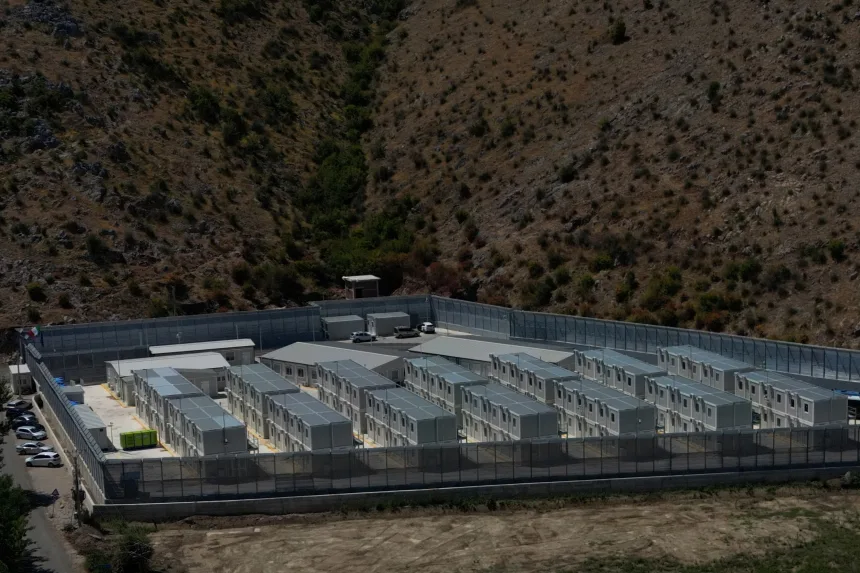This submission assesses Lithuania’s implementation of recommendations set out in the CESCR’s 2023 Concluding Observations, specificallly addressing the treatment of asylum-seekers and undocumented migrants. […]
Europe
Albania: Submission to the UN Committee against Torture
Albania operates a single dedicated immigration detention facility, the Karreç Detention Centre. In a submission to the UN Committee against Torture, the GDP raised concerns regarding conditions in the facility, as well as reports of the use of ad hoc detention sites and the country’s facilitation of Italian-managed detention centres on its territory. […]

European Court Ruling Challenges Italy–Albania Detention Deal and Other Externalisation Plans
On 1 August, the European Court of Justice delivered a landmark ruling on Italy’s application of the “safe country of origin” concept, delivering a blow to the country’s offshore asylum processing scheme in Albania. Beyond Italy, the ruling has wider implications across Europe, where it is likely to impact new EU asylum regulations due to come into force in June 2026, as well as EU Member States’ efforts to externalise their own migration management schemes. […]

Ireland: Growing Crackdown on Immigration and Asylum
Facing increasing pressures on its shared border with Northern Ireland and sharply rising asylum requests, Ireland has ramped up border controls and deportations. Growing Crackdown on Immigration in Ireland and Northern Ireland Recent reports reveal increasing immigration restrictions in Ireland, following a spike in irregular arrivals from the UK via Northern Ireland. According to the […]

Bosnia and Herzegovina: Reports of Pushbacks, Detention of Children and Inadequate Conditions in Detention Facilities
Recent reports reveal the abusive treatment of migrants and asylum seekers in Bosnia and Herzegovina, including violent pushbacks, arbitrary arrests, and the detention of children. Conditions in the country’s detention facilities have also been the subject of harsh criticism for their abysmal conditions and for failing to meet minimal standards. In a joint submission for […]

Slovakia: Detention Increases as Country Continues Migrant and Asylum Crackdown
Slovakia has been among the more outspoken opponents of the EU Migration Pact, adopted in April 2024, with the country’s new populist Prime Minister Robert Fico stating that Brussels “cannot order a country that it must accept, in the Slovak case, up to 300 migrants you know nothing about, or pay 20,000 euros for each […]

Lithuania: Reports of Arbitrary Detention, Physical Abuse, and Pushbacks
Recent reports highlight ongoing abuses of migrants and asylum seekers by Lithuanian border guards, including arbitrary detention, ill-treatment, and pushbacks into Belarus. The Human Rights Monitoring Institute (HRMI), a GDP partner in Lithuania, recently documented three cases involving unlawful restrictions of migrants’ liberty, abuses by Lithuanian authorities, and pushbacks to Belarus. According to their report, […]

Bulgaria: The Alarming Case of Detained Saudi Journalist Abdulrahman al-Khalidi
Bulgaria’s extremely long immigration detention of a Saudi law student and human rights activist reveals the degrading conditions in which migrants and asylum seekers are detained in the country. It also reflects a broader trend in Europe and globally: the de facto use of immigration detention for purposes that may have nothing to do with […]

Reports of Inhumane Conditions and Worrying Lack of Transparency at Milan’s CPR
In February, a detainee protest concerning harmful living conditions and health risks in a detention centre in Milan was met with violent repression. This latest event, one of a string of similar incidents in Italy’s network of CPRs (Centro di Permanenza per il Rimpatrio), has raised broader concerns about the disregard for human rights across […]

UN Experts Denounce Human Rights Backsliding in EU Migration Pact
UN Experts Denounce Human Rights Backtracking in EU Migration Pact […]




